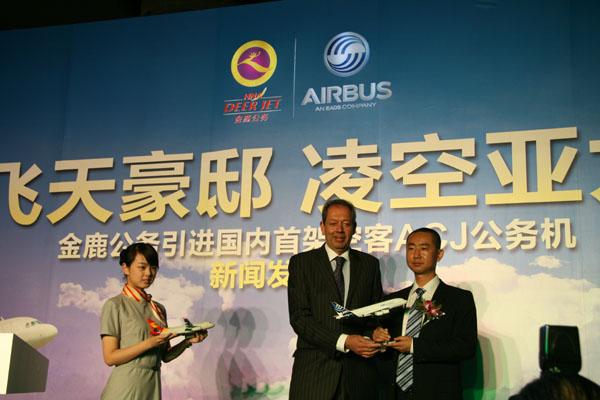
Beijing-based Deer Jet purchases an Airbus Corporate Jetliner (ACJ), one of the world's top business jets, for its charter flights service, May 18, 2011. David Velupillai, marketing director for Executive and Private Aviation Department of Airbus (middle), and Zhang Peng, vice president of Hainan Airlines subsidiary Deer Jet (right) are at the introduction press conference of ACJ.
China's growing economy is helping it become the world's second-largest market for corporate jets in the next decade.
Business jet services are still in their early stages of development, but China's strong economic growth continues to be the main driver for its aviation industry. The country's current Five-Year Plan set an annual GDP growth target of 7 percent.
There are currently 16,000 corporate jets aircraft in the world, but only 600 of them are in Asia. China will have 1,000 corporate jets within the next 10 years.
"The demand for corporate jet in China will grow 50 percent annually, and there will be at least 500 business jets by 2015," Zhang Peng, vice president of Hainan Airlines subsidiary Deer Jet, told China.org.cn. Deer Jet currently runs 39 business jets on more than 120 routes.
The world's leading aircraft producers are also very confident about China's jet market and are actively expanding their business in the country.
China accounted for 30 percent of Boeing's sales last year, and the aircraft producer expects its sales in China to grow in 2011. Airbus also sees huge potential in China's corporate jet market.
"Airbus has also recognized the fast growing market in China," said David Velupillai, marketing director for Executive and Private Aviation Department of Airbus. "The orders from China account for 25 percent of our corporate jet sales around the world, and the share will continue to grow in the future."
Airbus has sold more than 20 business jets to China since 2005, and it plans to sell five new ACJs in the greater China area each year over the next five years. To boost sales in the Chinese market, the company has adjusted the cabin design of its jets sold to China, Xinhua reported.
Business aviation did not take off in China until the mid-1990s, and it had been developing slowly because of higher taxes than commercial transportation. In addition to a 17-percent value-added tax, the government charges an additional 4 to 5 percent in other tariffs.
Today, there are still many challenges for developing the market. Although the government has recognized that corporate aviation can help expand the economy, business jet infrastructure, such as airports, private terminals and flying permission, should be available more quickly for users.
"There are many factors that have restricted the development of China's business jet market," said Liao Xuefeng of Bombardier China. "One is that China lacks flexibility in the air traffic control, so corporate jets cannot develop their strong points of customized service."



